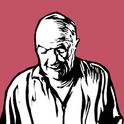1840: The writer Nathaniel Hawthorne, living in Boston, recalls The Reverend Doctor Harris:
“His especial haunt was the Athenaeum. There I used to see him daily, and almost always with a newspaper, the Boston Post. There he sat day after day, by the fireside; and, by degrees, seeing him so constantly, I began to look towards him as I entered the reading-room.
One day especially I am perfectly certain that I had seen him. But, that evening, a friend said: Did you hear that old Doctor Harris is dead? No, said I very quietly, and it cannot be true; for I saw him today. You must be mistaken, rejoined my friend. He is certainly dead! and confirmed the fact with such special circumstances that I could no longer doubt it. I believe that I was very little disturbed, if at all, but set down the apparition as a mistake of my own.
The next day I remember thinking: Well, I never shall see him again! With this thought in mind, as I entered the reading-room, I glanced towards his chair, and there, to my astonishment, sat the grey, infirm figure of the deceased Doctor, reading the newspaper as was his wont! His own death must have been recorded, that very morning, in that very newspaper! From that time, for a long time thereafter... I used to see the figure of Doctor Harris quite as frequently as before his death.”
1951: The novelist Anthony Powell recalls his close friendship with the composer Constant Lambert:
“After the war, Lambert took a flat in Albany Street, not far from where we lived in Chester Gate. He and I began to see each other again. In particular, he developed a habit of long telephone calls to me relatively late at night. He would ring up between half-past eleven and midnight, discussing at great length things which had amused him during the day. This would especially happen on Sunday evenings, when Lambert like to go through what had appeared on the book pages of the Sunday newspapers.
He was making these calls two or three times a week, when in August 1951, my wife and I went to the country, returning a fortnight later. My mother rang up the same evening, asking if we had seen in the paper that Constant Lambert had died. We had no knowledge of that, nor that he had been in a bad way for some days, then seemed to recover, followed by a terrible relapse that killed him.
The next night… at about quarter to twelve the telephone-bell rang. ‘It’s Constant,’ said my wife. I went downstairs and picked up the receiver. “Hullo?” There was no sound for an appreciable moment, then a click, followed by the dialling tone.”
“His especial haunt was the Athenaeum. There I used to see him daily, and almost always with a newspaper, the Boston Post. There he sat day after day, by the fireside; and, by degrees, seeing him so constantly, I began to look towards him as I entered the reading-room.
One day especially I am perfectly certain that I had seen him. But, that evening, a friend said: Did you hear that old Doctor Harris is dead? No, said I very quietly, and it cannot be true; for I saw him today. You must be mistaken, rejoined my friend. He is certainly dead! and confirmed the fact with such special circumstances that I could no longer doubt it. I believe that I was very little disturbed, if at all, but set down the apparition as a mistake of my own.
The next day I remember thinking: Well, I never shall see him again! With this thought in mind, as I entered the reading-room, I glanced towards his chair, and there, to my astonishment, sat the grey, infirm figure of the deceased Doctor, reading the newspaper as was his wont! His own death must have been recorded, that very morning, in that very newspaper! From that time, for a long time thereafter... I used to see the figure of Doctor Harris quite as frequently as before his death.”
1951: The novelist Anthony Powell recalls his close friendship with the composer Constant Lambert:
“After the war, Lambert took a flat in Albany Street, not far from where we lived in Chester Gate. He and I began to see each other again. In particular, he developed a habit of long telephone calls to me relatively late at night. He would ring up between half-past eleven and midnight, discussing at great length things which had amused him during the day. This would especially happen on Sunday evenings, when Lambert like to go through what had appeared on the book pages of the Sunday newspapers.
He was making these calls two or three times a week, when in August 1951, my wife and I went to the country, returning a fortnight later. My mother rang up the same evening, asking if we had seen in the paper that Constant Lambert had died. We had no knowledge of that, nor that he had been in a bad way for some days, then seemed to recover, followed by a terrible relapse that killed him.
The next night… at about quarter to twelve the telephone-bell rang. ‘It’s Constant,’ said my wife. I went downstairs and picked up the receiver. “Hullo?” There was no sound for an appreciable moment, then a click, followed by the dialling tone.”












